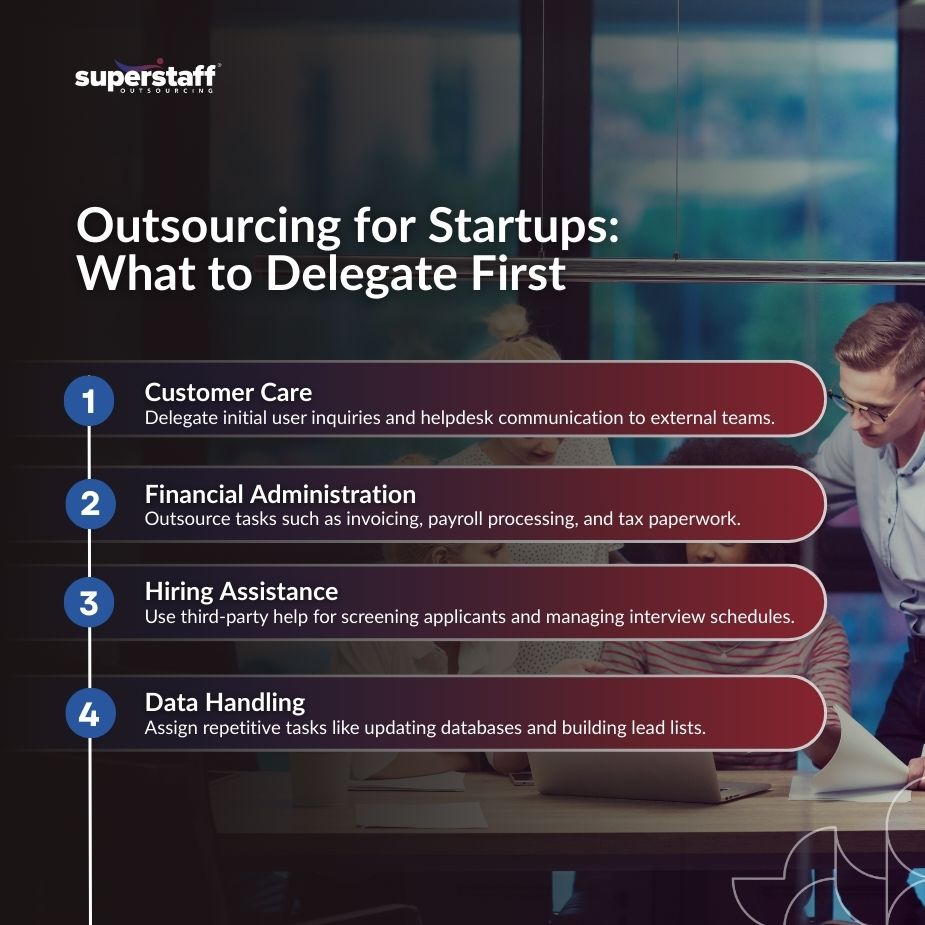
Startups move fast. But moving fast without the right support can slow everything down. The answer is outsourcing for startups.
As a startup founder, your focus is on building your product, gaining users, and growing your team. But how do you manage everything with limited time, tools, and people? This is where outsourcing for startups comes in. Done right, it helps reduce costs, fill talent gaps, and support faster growth.
Still, not everything should be outsourced right away. Some tasks need your full attention—at least in the early stages. This article explores what high-growth startups typically outsource first and why, what they should keep in-house for now, and how to strike the right balance.
What Startups Commonly Outsource First (and Why)

Outsourcing for startups often starts with time-consuming but easy-to-handle tasks. These are usually repeatable and don’t require deep product or brand knowledge.
1. Customer Support
Startups that quickly gain users often receive a flood of support tickets. Instead of letting these pile up, many founders outsource helpdesk and chat services early. This keeps users happy without distracting engineers or marketers from their core tasks.
2. Bookkeeping and Payroll
Accounting is necessary but often complicated. Hiring an in-house finance team too early can be costly. Outsourcing monthly reports, invoicing, and tax filing is a smart step for early-stage startups that need clean books without the overhead.
3. Recruitment Support
Need to double your team in three months? Outsourced recruitment coordinators can help with resume screening, scheduling, and follow-ups. This frees up internal leaders to focus on hiring decisions, not logistics.
4. Data Entry and List Building
Many growth tasks—like generating lead lists or cleaning up CRM data—are essential but repetitive. These jobs are ideal for outsourcing because they don’t require deep strategy.
Outsourcing for startups in these areas supports growth without overwhelming small teams.
What Startups Shouldn’t Outsource Too Early
Not everything should be handed off. Some areas need to stay close to the founders, especially early on.
1. Core Product Development
Your product is your business. It’s important to keep your dev team in-house early to protect your intellectual property and ensure faster iterations.
2. Strategic Marketing and Branding
Your brand is still evolving. If you outsource too early, you risk losing control of your voice and messaging. At this stage, it’s better to keep key marketing strategy decisions internal. Nearly 70% of startups report that maintaining consistent brand messaging is a major challenge during early growth stages. Outsourcing marketing too soon can lead to mixed messages and weaken brand identity.
3. Final Hiring Decisions
You can outsource sourcing and screening, but choosing who joins your core team should remain in-house. These people shape your culture and product, so decisions should not be rushed or delegated.
4. Customer Success for Early Adopters
Feedback from your first users is valuable. Founders and product leads should hear it directly. Don’t outsource this touchpoint too soon.
These early functions need time, attention, and alignment with your long-term goals. The choice between in house vs outsourcing should always depend on impact and timing.
How to Know You’re Ready to Outsource
Outsourcing for startups should not happen just because you’re busy. Here are a few signs it’s time to offload a task:
- The task is no longer evolving and doesn’t need strategic input
- You have clear instructions, or can build a process (SOP) easily
- Work in this area is causing delays in other departments
- You’re spending more time than it’s worth doing it internally
If you check off more than one of these, outsourcing might bring immediate value.
Outsourcing Models That Work for Startups
Choosing the right model helps you stay flexible while scaling. Different types of outsourcing work for different needs.
1. Project-Based
Ideal for one-time needs like building a website, making a pitch deck, or cleaning data. You define the task, and the provider delivers the result.
2. Team Extensions
Helpful when you need extra hands for a specific department, like support or recruitment. These workers plug into your team and follow your lead.
3. Fully Managed Services
Great for repetitive tasks that don’t need internal oversight, such as payroll or compliance. The provider handles everything with minimal direction.
4. Transactional vs. Consultative
- Transactional: You give a task, they do it.
- Consultative: You get expert advice along with execution. Pick based on whether you need execution only or added guidance.
Using the right model keeps outsourcing for startups aligned with business goals and team workflows.
Common Startup Outsourcing Mistakes to Avoid
Many startups run into problems when they outsource without proper planning. Here are some issues to watch out for:
- No documentation or clear instructions
- Expecting external teams to “figure it out” with little context
- Not integrating vendors into your tools or workflows
- Ignoring data security, especially in HR or finance functions
- Changing providers often without fixing internal gaps
These startup mistakes reduce quality, create confusion, and waste resources. Avoid them by preparing before you outsource.
Outsourcing for Startups: Build Smart, Scale Right
Outsourcing for startups works best when used with purpose, not just to save time. The goal is to support your core team, not replace it.
Start with functions that slow you down but don’t need strategic direction. Keep product, hiring, and brand decisions close until your systems mature. Use clear processes, select the right outsourcing model, and integrate vendors like extensions of your team.
Done right, outsourcing keeps your startup lean and focused—ready for long-term growth.
If you’re ready to take the next step in your growth journey, outsourcing for startups can help you move faster without losing control.
At SuperStaff, we help startups scale smarter. Whether you need support teams, recruitment help, or back-office services, we make sure you outsource the right tasks at the right time.
Contact us to learn how we can help your team stay focused on growth while we take care of the rest.






